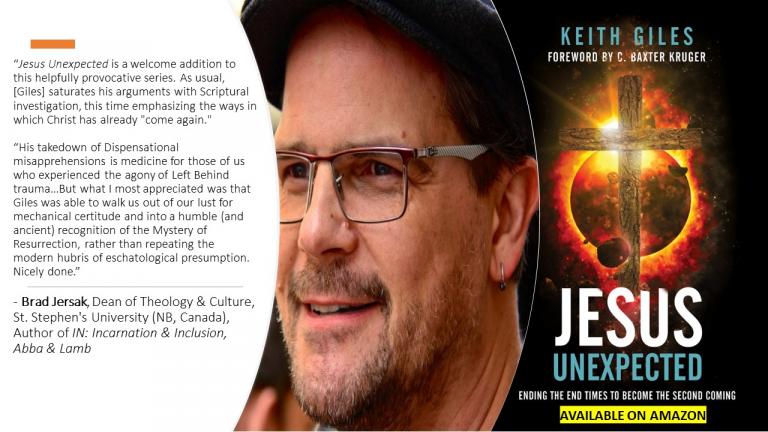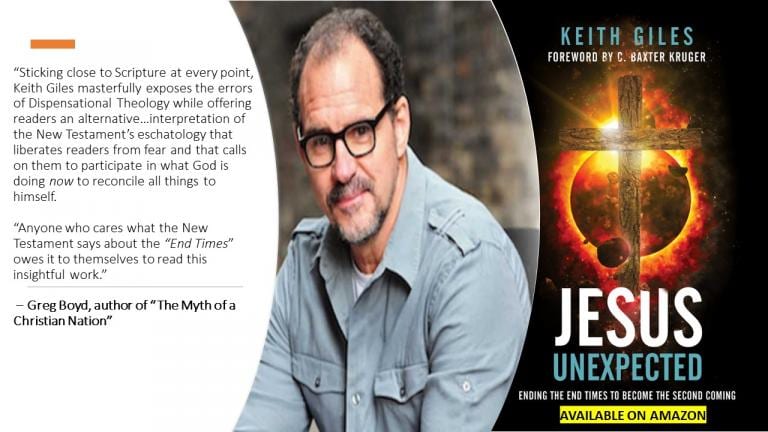
Other than the fact that a large majority of Christians have been raised to believe in the End Times Rapture theory created in 1850 by John Nelson Darby, the main reason there’s so much confusion about the End Times and Biblical Prophecy is how we have been trained to understand certain Biblical terminology.
For example, when we read the phrase “the end of the age” we hear “the end of the world” or “the end of time,” but that’s NOT what the phrase is referring to.
“The end of the age” is a reference to the end of the Jewish age which was originally prophesied in the book of Daniel [See Dan. 12:7 & 13] and later confirmed by Jesus in his Olivet Discourse. It’s not about when the world will end or the planet will be burned up, but about when the age of the Jewish people ends and the age of the Gentiles begins. Paul makes reference to this in Romans, also.
The end of the Jewish is simply when the Old Covenant Temple was destroyed, the Old Testament priesthood was ended and the daily animal sacrifice ceased forever. That was what happened in AD 70.
The end of the age is also the beginning of the next age [or the “age to come”] where the New Covenant reality is unfolded and expanded upon the earth. This is the age we are in right now.
Another phrase we tend to misunderstand is “coming in the clouds” in reference to Jesus. For example, when Jesus says that people will see him coming in the clouds in Matthew 24, or when he tells the High Priest that soon “…you will see the Son of Man sitting at the right hand of the Mighty One and coming on the clouds of heaven” [Matt. 26:64], he is not talking about the day he literally comes riding in the sky on a horse to initiate the Rapture.
The term “coming in the clouds” is a reference to God’s judgment being poured out on a nation or a city used all throughout the Old Testament scriptures by various prophets. It’s never a literal “coming in the clouds” where God shows up physically in the skies, but always a metaphorical way of saying that the destruction God’s prophets warned the people to avoid is about to be poured out – usually in the form of an invading army which destroys Babylon, or Edom, or Egypt or even Jerusalem.
Another example of how the coming of Jesus is seen as a warning of judgment is in Revelation where Jesus speaks to the seven churches in the first few chapters and each time he warns them to repent of their sins he mentions that if they do not he will “come to them” and take away their lampstand or rebuke them in some way. The “coming” in this sense is not a good thing. It’s a sign of something you want to avoid if at all possible.
One related misunderstanding is also about the Second Coming of Christ where we tend to view this event as a literal physical return of Jesus in the flesh. However, the term in the Greek is “parousia” and it simply means “presence” which in the case of Christ is something we can all experience right now, even though Jesus isn’t physically in the room with us.
The word parousia is found in the following verses: Matthew 24:3, 27, 37, 39; 1 Corinthians 15:23; 1 Thessalonians 2:19; 3:13; 4:15; 5:23; 2 Thessalonians 2:1,8,9; James 5:7,8; 2 Peter 1:16; 3:4,12; 1 John 2:28.
Our challenge, then, is in what way the term “coming” is used or intended to be understood in the New Testament. Sometimes the “coming” is in reference to the fulfillment of a prophetic judgment event [as seen when Jerusalem is destroyed by the Romans in AD 70], and other times the “coming” of Christ is in reference to the presence of Christ being experienced spiritually by us here and now.
These are two different things: The “coming” which involves the fulfillment of apocalyptic prophecy by invading armies, and the “coming” which involves the experience of the presence of Christ by those who are abiding in Christ today.
Understanding the differences between when the context is the apocalyptic destruction and when the context is the presence of Christ now is pretty important.
For further study on this topic, I recommend the new book I just published from Quoir called “Jesus Unexpected: Ending the End Times to Become the Second Coming” which also features a Foreword by Baxter Kruger.
You can pick up a copy on Kindle or in Paperback.
Here’s what a few nice people had to say about my book:



**
Deconstructing your faith? Need a community to help you find space to Reconstruct your faith? If so, please meet me at Square 1. This 90-day online course is designed to help you move through the painful process of Deconstruction and onward through the freedom and joy of Reconstruction. Our next round starts Sept. 21. Register for 50% off for a limited time HERE
Keith Giles and his wife, Wendy, work with Peace Catalyst International to help build relationships between Christians and Muslims in El Paso, TX. Keith was formerly a licensed and ordained minister who walked away from organized church over a decade ago to start a home fellowship that gave away 100% of the offering to the poor in the community. Today he is the author of several best-selling books, including “Jesus Unexpected: Ending The End Times To Become The Second Coming” which is available now on Amazon.













